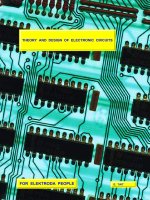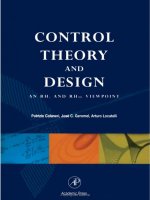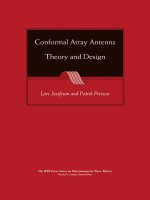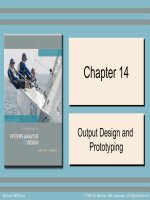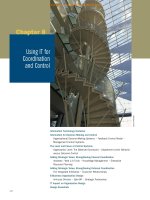Organization theory and design: Lecture 14
Bạn đang xem bản rút gọn của tài liệu. Xem và tải ngay bản đầy đủ của tài liệu tại đây (26.37 KB, 8 trang )
Manufacturing & Service
Technologies
• Exploring manufacturing and service
technologies and how technology is related to
organizational structure
14
1
Manufacturing & Service
Technologies
• Technology refers to tools, techniques,
machines and actions used to transform
organizational inputs (materials, information,
ideas) into outputs (products and services)
• Technology is an organization’s production
process and includes work procedures as well
as machinery
• For a service organization technology includes
the equipment and procedures for delivering the
service
2
Organizational Level Manufacturing
Technology
Woodward’s Study:
• She classified manufacturing firms
according to the technical complexity of
the manufacturing process.
• Technical complexity represents the
extent of mechanization of the
manufacturing process.
• High and low technical complexity and role
of machines and workers
3
Woodward’s Technical Complexity
Categories
1. Small batch and unit production:
–
job shops, assemble small orders, specific needs of
customers are met, human operators have prime
importance,
1. Large batch and mass production:
–
long production runs of standardized parts, output
goes into inventory, customers do not have special
needs, (assembly lines for automobiles)
1. Continuous Process Production:
–
entire process is mechanized, no starting and
stopping, mechanization and standardization are
one step ahead of assembly lines, outputs are
highly predictable, (chemical plants, oil refineries)
4
Relationship Between Technical
Complexity & Structural Characteristics
Structure
Unit Production Mass
Production
Continuous Process
Production
Mgt levels
3
4
6
Superv span
23
48
15
Direct/indir lab
9:1
4:1
1:1
Mgr/t perso
low
med
High
Worker skills
high
low
High
Formalization
low
high
Low
Centralization
low
high
Low
Verbal Com
High
Low
High
Written Com
Low
High
Low
Overall
structure
organic
mechanistic
organic
5
Woodward’s own Words
• “Different technologies impose different
kinds of demands on individuals and
organizations, and those demands had to
be met through an appropriate structure”.
6
Computer Integrated Manufacturing
(CIM)
• CIM is also called advanced
manufacturing technology, agile
manufacturing, the factory of the future,
smart factories, or flexible manufacturing
systems
• Mass customization
7
Mass Production & CIM
Characteristic
MP
CIM
Span of control
Hierarchy levels
Tasks
Specialization
Decision making
Overall
HR interactions
Training
Expertise
Customer demand
Suppliers
wide
many
routine
high
centralized
mechanistic
standalone
narrow
manual
stable
many
narrow
few
adaptive
low
decentralized
organic
teamwork
broad, frequent
cognitive
changing
few, close relations
8

